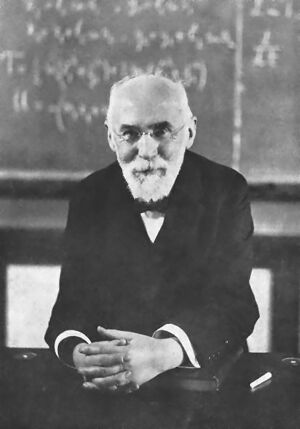Hendrik Lorentz (nonfiction): Difference between revisions
No edit summary |
No edit summary |
||
| Line 10: | Line 10: | ||
== Fiction cross-reference == | == Fiction cross-reference == | ||
* [[Crimes against | * [[Crimes against physical constants]] | ||
* [[Gnomon algorithm]] | * [[Gnomon algorithm]] | ||
* [[Gnomon Chronicles]] | * [[Gnomon Chronicles]] | ||
| Line 16: | Line 16: | ||
== Nonfiction cross-reference == | == Nonfiction cross-reference == | ||
* [[Geertruida de Haas-Lorentz (nonfiction)]] - Doctoral student | |||
* [[Albert Einstein (nonfiction)]] | * [[Albert Einstein (nonfiction)]] | ||
* [[Adriaan Fokker (nonfiction)]] - Doctoral student | |||
* [[Leonard Ornstein (nonfiction)]] - Doctoral student | |||
* [[Physics (nonfiction)]] | * [[Physics (nonfiction)]] | ||
* [[Pieter Rijke (nonfiction)]] - Doctoral advisor | |||
* [[Hendrika Johanna van Leeuwen (nonfiction)]] - Doctoral student | |||
External links: | External links: | ||
Latest revision as of 20:02, 29 March 2019
Hendrik Antoon Lorentz (18 July 1853 – 4 February 1928) was a Dutch physicist who shared the 1902 Nobel Prize in Physics with Pieter Zeeman for the discovery and theoretical explanation of the Zeeman effect. He also derived the transformation equations which formed the basis of the special relativity theory of Albert Einstein.
According to the biography published by the Nobel Foundation, "It may well be said that Lorentz was regarded by all theoretical physicists as the world's leading spirit, who completed what was left unfinished by his predecessors and prepared the ground for the fruitful reception of the new ideas based on the quantum theory." For this he received many honors and distinctions during his life, including—from 1925 to his death in 1928—the role of Chairman of the exclusive International Committee on Intellectual Cooperation.
In the News
Fiction cross-reference
Nonfiction cross-reference
- Geertruida de Haas-Lorentz (nonfiction) - Doctoral student
- Albert Einstein (nonfiction)
- Adriaan Fokker (nonfiction) - Doctoral student
- Leonard Ornstein (nonfiction) - Doctoral student
- Physics (nonfiction)
- Pieter Rijke (nonfiction) - Doctoral advisor
- Hendrika Johanna van Leeuwen (nonfiction) - Doctoral student
External links:
- Hendrick Lorentz @ Wikipedia
